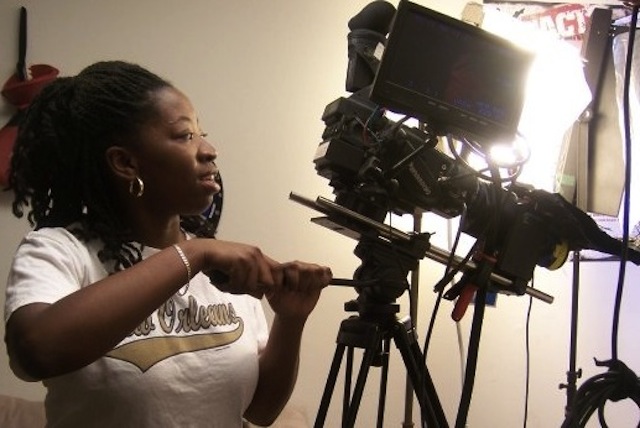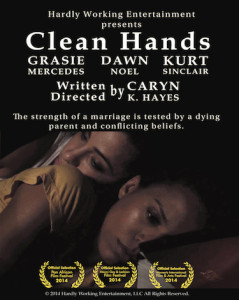Interview by Michelle A. Dowell-Vest

Every Dawg Has Its Day, The Ridge, Dirty Thirties, The World of Cory & Sid, Breaking Point and now Clean Hands; these are all film projects written and directed by award-winning Indie Filmmaker Caryn Hayes. Born and raised in New Orleans, Hayes, like any filmmaker worth their weight in 8mm film, made her way to Los Angeles. She showed up to Los Angeles ready to do business, and has shown herself worthy by her litany of awards.
Her accolades include a TV Pilot Award from the Organization of Black Screenwriters both in 2007 and in 2009. She also received the award for Outstanding Writing in a Drama Series in 2011 at the Los Angeles Web Series Festival. In 2009 the Urban Mediamakers Film Festival nominated The World of Cory & Sid for Best Television or Web Series.
This year, in between writing sketch comedy and new episodes of Entangled, she managed to write and direct Clean Hands; a short film following Anna and Kirsten, a married couple caring for Anna’s terminally ill and homophobic father.
The film was released this year at the Pan African Film Festival and is making it around the festival circuit. Clean Hands plans on screening at The Miami Gay & Lesbian Film Festival and the Women’s International Film & Arts Festival.
Tagg had a chance to sit down and talk with Caryn Hayes and get a peek into her life beyond her biography.
Tagg Magazine: Can you tell me about who Caryn is at home, on a Sunday morning?
Hayes: My Sundays are usually lazy unless I’m in pre- post- or production so it’s working or sleeping. I live a very humdrum life, really. I love hanging with friends, going out to dance, and staying in for a game night. I’m addicted to good television and I love playing sports, though it’s rare I get to do the latter.
 TM: What specific moment did you know you wanted to be a filmmaker?
TM: What specific moment did you know you wanted to be a filmmaker?
Hayes: Up until college my goal was to write fiction. It was in college that I fell in love with production and I switched my intentions from writing fiction to writing for television. Now I just write whatever strikes me, and I produce and direct what I can.
TM: What’s your favorite project and why?
Hayes: This is a really hard question! While I can’t say I love all of my projects equally, I do love them for different reasons. Clean Hands has the best production value of anything I’ve ever done; and Breaking Point really was a test in every way possible and it’s a huge accomplishment on every level for me, as the challenges we faced seemed insurmountable at times.
That said, I think I have to go with Entangled with You. Entangled doesn’t have the production value of either Clean Hands or Breaking Point. It doesn’t have as many accolades nor is it as lauded. Simply, it’s just more fun. It encompasses all of my favorite things about what I do: drama, comedy, and romance. I take more risks with [this film], which is exhilarating. The cast is free to ad-lib so we’re making jokes and implementing them on set. The production schedule for S2 was utterly ridiculous and improbable, much harder than anything I’ve ever completed, but complete it we did and I had a blast getting it done.
TM: What was your least favorite project and why?
Hayes: I don’t have a least favorite project. Even the ones that didn’t turn out the way I wanted, I don’t regret. They’ve all taught me something important and invaluable.
TM: Tell me the story about how you came up with the name for your production company.
Hayes: To me, I love what I do so it is “hardly work”. Also, I work really hard, which you probably can’t tell because I never complain about it on twitter or anything. It’s not like I have a #TiredCreator hashtag that I use. I thought the contrast was fun. Lastly, I had this really cool idea of what my animated tag at the end of the movie/episode would look like.
TM: Can you tell me about your first film, and what it was like to make it?
Hayes: The first Hardly Working project was a short film called Every Dawg Has His Day. I wrote and produced it but didn’t direct. It was empowering to bring it together, and also educational. It cost far too much and I made far too many compromises, but I’ve learned and I’ve grown. I knew what not to do with my follow-up projects.
TM: You have produced more than one web series. What advice would you give about making projects for TV and the Internet? Is there a difference?
Hayes: There’s usually a difference in budget, probably even for a House of Cards or an Orange is the New Black. The other major difference is the freedom and independence you get without having the traditional network heads and broadcast standards and practices. The further you get from traditional broadcast, the easier it is to produce less traditional content, to be niche, and to speak to and for a particular audience. Other than that, good storytelling is good storytelling. The episodes may be shorter, there may be an interactive component, but the endgame is the same. Building characters and creating situations and events that spark conversation; that touch the audiences, entertains, and hopefully enlightens should always be there no matter the medium.
TM: How does your brand of activism show up in your world of filmmaking?
Hayes: Activist might be a strong word but I am definitely passionate about diversity. I write inclusive content because everyone’s story should be told. I always seek to create characters that are diverse and relatable. It’s important to me and society, I believe, to see ourselves represented in media, not only in characters who look like us, but also in characters who we don’t think we would ever share anything in common. There is no character in any television show I am more like than Cristina Yang [from Grey’s Anatomy] but historically, physically, and socio-economically, we could not be more different. To me, that’s important to see and cultivate; it matters.
I create characters who go against stereotypes. I like to take those and turn them on their heads. Why can’t the white girl be the sassy one and the black girl be the geek? Can we have masculine-presenting lesbians who are sensitive and not aggressive? I think when creators are inclusive we have the ability to open minds. If you only write for a certain segment of society, you limit your ability to reach beyond that segment. Okay, maybe I am an activist (laughs). I just don’t like labels.
“Clean Hands” is now available as a digital download and streaming rental, making the film directly available to her fans and lesbian cinephiles alike at https://www.reelhouse.org/hardlyworkingtv/clean-hands.


